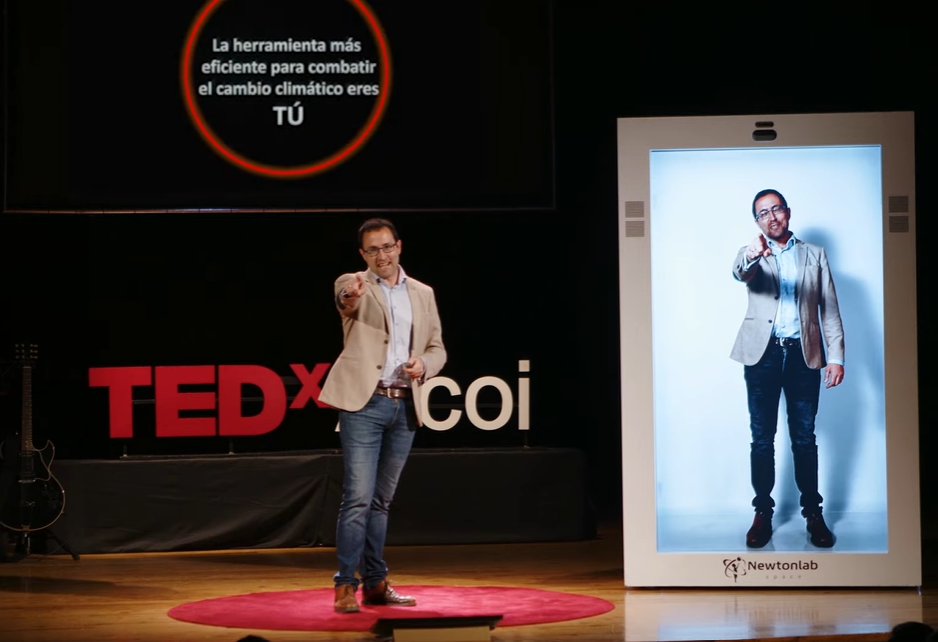Jose F. Monserrat, Vice-Rector for Internationalization and Communication, Professor at the University, and Researcher at iTEAM, presents challenges and opportunities for the planet regarding climate change and mobility in his TEDx talk in Alcoi.
The world is in a constant state of change, and while some changes can be considered natural, the primary driving force behind the current shifts is human activity. Since the 19th century, the burning of fossil fuels, particularly in relation to transportation, has become the main contributor to climate change. However, the alarming issue at hand is the speed at which these changes are occurring, as scientists are uncertain if ecosystems can adapt to such rapid transformations.
According to the Observatory for Sustainable Mobility, the effects we are currently witnessing regarding climate change are largely caused by our own mobility patterns. Astonishingly, approximately 80% of nitrogen oxide emissions, known to be harmful, originate from our vehicles. Furthermore, nearly 30% of greenhouse gas emissions are derived from transportation and mobility. Comparing it to three decades ago, when the average person in this country traveled less than 20 km per day by car, we now cover around 40 km daily, almost tripling the number of daily commutes.
Out of every ten trips, four are made using private cars or motorcycles, while only one is taken using public transportation such as the metro, bus, or train. These statistics highlight the urgent need for change. While reflecting on these data, let me introduce someone special to me—my other self, projected as my avatar. We’re here today to emphasize the importance of this topic.
In this era known as the Anthropocene, geologists attribute the significant changes we are experiencing to human actions and mobility. Consequently, it is our actions that determine the course of these changes, and therefore, it is within our power to reverse the negative trends. The planet is sending us an urgent message, and it is up to us to respond.
First and foremost, we must strive to improve the efficiency of our mobility. This involves embracing low or zero-emission vehicles, such as electric, hybrid, or hydrogen-powered cars that are already available in the market. These vehicles significantly enhance the energy efficiency of transportation, reducing energy costs per kilometer by two to three times compared to combustion engines.
While these vehicles may come with a slightly higher price tag, their energy savings throughout their lifespan make them a worthwhile investment. Additionally, their simpler and less maintenance-intensive design, coupled with lower emissions and reduced pollutant impact on our air quality, contribute to a cleaner and healthier environment. Moreover, they offer the flexibility to navigate restricted zones within cities. Advancements in technology, such as the emergence of cheaper sodium-based batteries and improved battery recycling, indicate that these eco-friendly vehicles will soon become more affordable than their combustion engine counterparts.
To achieve sustainable mobility, we must initiate a shift in our travel habits. Planning our journeys in advance to prioritize public transportation whenever possible, instead of relying solely on private vehicles, can make a significant difference. Embracing active mobility, such as walking or cycling, whenever feasible is also crucial. Moreover, adopting shared mobility concepts, where vehicles are not individually owned but accessed as needed, can reduce the number of vehicles on the streets, further easing congestion and pollution.
Lastly, we need to avoid unnecessary travel when alternatives are available. Whenever feasible, opting for video conferencing or holographic communication instead of physical presence can save considerable travel distances. It is vital to realize that our actions should focus on reducing our negative impact on the planet, allowing globalization to coexist with nature’s preservation.
In conclusion, sustainable mobility plays a critical role in addressing climate change. By improving vehicle efficiency, transforming our transportation habits, and minimizing unnecessary travel, we can collectively ensure the survival of our planet as we know it. The planet is calling out to us, and it is our responsibility to respond by taking immediate and decisive action. Together, let us embark on this transformative journey towards a sustainable and resilient future.

